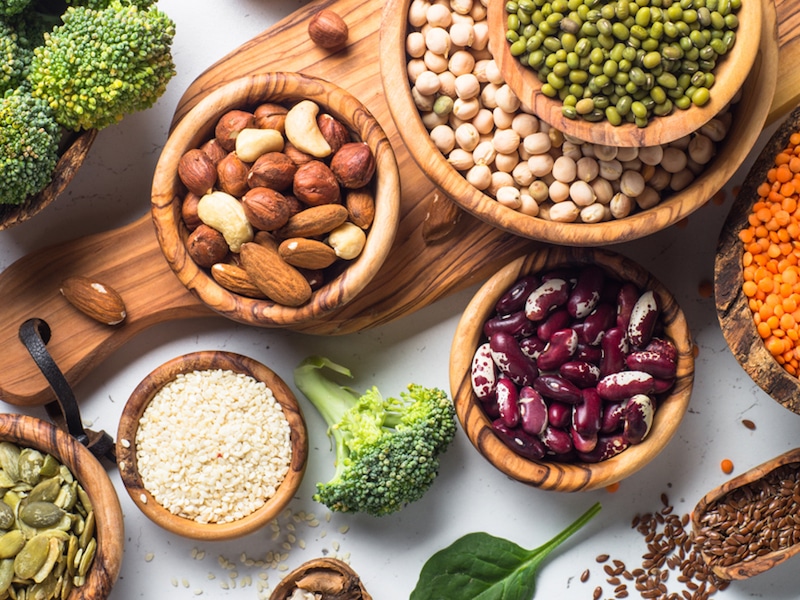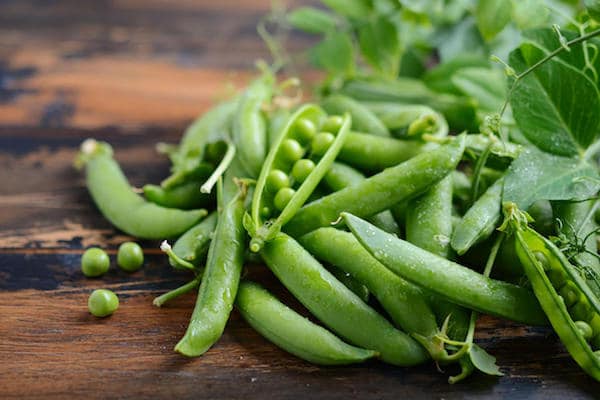No products in the cart.
Best Sources Of Plant Protein For Vegans & Vegetarians

Have you made the decision to stop eating meat? If you have then you may now be wondering what type of food you can eat, especially foods that are rich in protein.
Protein is an essential nutrient that your body needs, especially if you are looking to build muscle.
Here are some meat-free alternatives that you should consider adding to your weekly shopping list.
#1: Seitan
Seitan is a popular choice of protein made from gluten, which is the main protein found in wheat.
When cooked seitan resembles the look of texture of meat.
It contains 25 grams of protein in every 100 grams, which makes this one of the best sources of plant protein [1].
Seitan can be used in a variety of recipes, as it can be pan-fried, sautéed or grilled. It should be avoided if you have celiac disease, or have a sensitivity to gluten.
#2: Tofu
Tofu is made from soybeans, which are considered a whole source of protein. This means that it contains all of the essential nutrients required by the body.
While tofu hasn’t much taste, it does absorb the flavour of other ingredients that it is prepared with.
Tofu is rich in iron, calcium and contains 10-19 grams of protein in every 100 grams [2].
#3: Lentils

Lentils are a good source of protein and contain 18 grams in every cooked cup (240 ml).
They can be used in a variety of dishes, and are also a good source of slowly digesting carbs.
The fibre found in lentils has been shown to feed the good bacteria found in your colon. This will help to encourage a healthy gut.
#4: Chickpeas
Chickpeas, or garbanzo beans as they are often called are a good source of protein, containing 15 grams of protein in every 240 ml cup.
They are also a good source of complex carbs, fibre, iron, potassium and other beneficial nutrients.
Research has found that chickpeas can help reduce cholesterol, can help control blood sugar levels, reduce blood pressure and aid fat loss [3][4][5][6].
#5: Ancient Grains
Ancient grains like spelt and teff are a type of wheat that is rich in protein.
Both of them contain 10-11 grams of protein in every 240 ml cup. They are also a good source of complex carbs, fibre iron, magnesium, phosphorus and manganese.
Spelt and teff are also a good source of other nutrients such as B vitamins, zinc and selenium.
Unlike common grains, such as wheat and rice, ancient grains are more versatile and can be used in various recipes.
#6: Hempseed
Hempseed belongs in the same family as the marijuana plant but contains just a trace of THC, the compound that causes the drug-like effects.
It contains 10 grams of complete protein, along with a healthy amount of magnesium, iron, calcium, zinc and selenium.
To add hemp seed to your diet you simply need to sprinkle the seeds over your meals, for instance over your salad or cereal.
#7: Green Peas

Green peas are high in protein (9 grams in every 240 ml cup) and contain other vitamins and minerals essential for good health.
You can use green peas as a side dish to your main meal, or they can be used in other recipes such as pea soup, or in pea and avocado guacamole.
#8: Spirulina
Spirulina a full of nutrients, with 8 grams of protein in just 2 tablespoons (30 ml). It is also a good source of iron, thiamin, magnesium, riboflavin, manganese, potassium and essential fatty acids.
Research has found that those who consume spirulina had a stronger immune system, lower blood pressure and better blood sugar and cholesterol levels [7][8][9][10].
#9: Quinoa
Unlike other ancient grains, quinoa doesn’t grow from grass. However, it can be prepared and ground into flour like more common grains.
Quinoa is a complete protein and contains 8-9 grams of protein in every 240 ml cup. It is also a good source of complex carbs, fibre, iron, manganese, phosphorus and magnesium.
#10: Soy Milk
If you are looking for an alternative to cow’s milk then look no further than soy milk.
It contains 7 grams of protein per 240 ml cup and is also a good source of calcium, vitamin D and vitamin B12.
Soy milk does not naturally contain vitamin B12 so I would recommend choosing a fortified variety.
#11: Oats

Oats may not be a complete protein, but they are a better source of protein than most commonly consumed grains, such as rice and wheat.
Half a cup (120 ml) will contain 6 grams of protein along with 4 grams of fibre. Along with a good amount of other nutrients that include magnesium, zinc, phosphorus and folate.
Oats are versatile and can be used in many recipes, they can even be ground into flour and used when baking.
#12: Nuts & Seeds
Nuts, seeds, along with nut butter are a great source of protein. Depending on which nut or seed you choose you could consume 5-7 grams of protein in every ounce (28 grams).
Nuts and seeds are a great option when choosing a snack food. While nut butter is a good alternative to common household butter that contain oil, sugar and excess salt.
In Conclusion
If you have made the decision to cut meat from your life you do not need to fear lacking nutrients such as protein.
Our list of meat-free protein will ensure you are getting enough protein from your diet.
